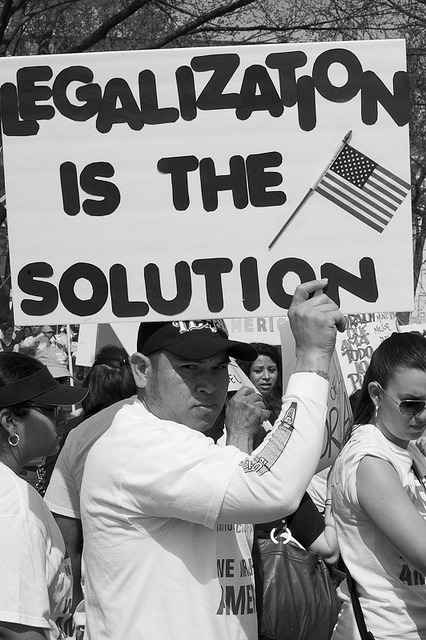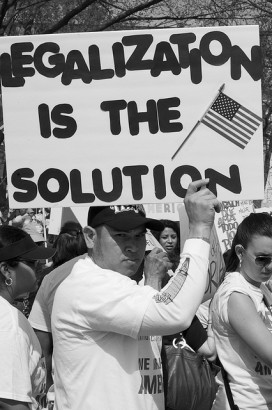The economic costs and benefits of legalizing undocumented immigrants has been one of the most intensely debated questions surrounding comprehensive immigration reform. Recently, the conservative Heritage Foundation published a report claiming immigration reform would create a $6.3 trillion U.S. budget deficit, an assertion that was criticized by reform advocates.
Economist David Dyssegaard Kallick is weighing in on the economic debate in a report published this month by the Fiscal Policy Institute (FPI). The report makes the case that legalizing undocumented immigrants and preventing future unauthorized immigration would have a positive economic impact on the U.S. economy. Kallick looks at three key areas – reducing barriers to career advancement, creating a more equitable playing field for businesses, and balancing taxes and social services.
Drawing largely from research following the 1986 immigration reform bill, the report also shifts the immigration conversation away from a simple cost-benefit analysis to looking at immigration reform as a roadmap to more balanced government policy.
According to Kallick’s analysis, should immigration reform pass newly documented immigrants would benefit from a wider range of job options, decreased exploitation by employers, and better access to higher education. Currently, legal immigrants earn 10% higher wages on average than those who are undocumented.
Undocumented youth or DREAMers may benefit even more than their older counterparts.
“For a young high school graduate who in every other ways seems indistinguishable from their peers, who can go to college, get a drivers license, join the labor market like their friends—that’s a more significant boost in their earning and career potential,” Kallick says.
DREAMers who attend college also stand to earn higher salaries overall, thereby increasing their economic contributions. The median income for a current documented immigrant almost doubles with completion of a 4-year degree, from $30,000 for high school grads to $56,000 for college grads.
Business ethics are heavily stressed in the report, which claims that stricter business regulations are necessary for both preventing future unauthorized immigration and ensuring immigrant workers are being treated fairly. Once businesses are prevented from dodging payroll taxes and required to provide adequate employee benefits such as health insurance and overtime pay they will make larger contributions to the U.S. economy.
Immigrant entrepreneurs are also discussed in the report, which states that 18% of small business owners nationally, and 29% of small business owners in New York are immigrants. Legalizing undocumented immigrants, Kallick argues, would provide more opportunities for growth in the small business sector as well, which already shows strong numbers among immigrant entrepreneurs.
The report stands behind strategies to prevent future undocumented immigration as laid out in the current Senate immigration reform bill, namely investing in tighter border controls and requiring U.S. businesses to use the E-Verify identity verification system. But Kallick stresses that these tactics are only partially effective.
“There’s no amount of border enforcement that will stop undocumented immigrants from coming. 40% of undocumented immigrants did not come over the border. Unless you address employers who are willing to hire undocumented immigrants off the books, you risk recreating the problem,” Kallick argues.
Kallick’s report concludes that the costs and revenues associated with legalizing undocumented immigrants – both on the federal and New York state level – will increase proportionately. Legalized immigrants would pay their fair share of taxes, while also receive their fair share of social services, leading to a more aligned economy and equitable society.
The FPI report perhaps isn’t the most provocative to come out in recent months, but it takes a balanced approach. Kallick doesn’t claim that legalizing undocumented immigrants will be the saving grace of the struggling U.S. economy. Rather, Kallick describes a measured approach, which he believes could lead to greater economic stability.
“I think that people sometimes exaggerate the potential consequences – positive or negative,” Kallick says. “I hope people will feel like there is a clear gain to all of us to having a context in which everyone who’s here has legal status.”
Fi2W is supported by the David and Katherine Moore Family Foundation and the Ralph E. Odgen Foundation.





